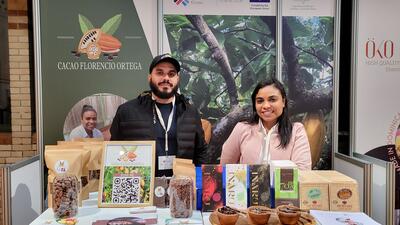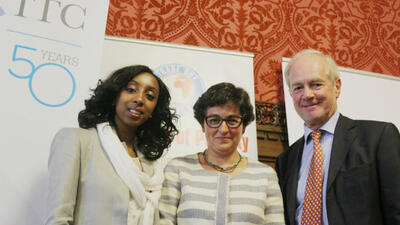
ITC statement at the plenary session of the SIDS conference (en)
ITC statement by the Executive Director at the plenary session of the SIDS conference,
2 September 2014, SAMOA
(CHECK AGAINST DELIVERY)
Distinguished representatives
I commend the Government of Samoa for the excellent organisation of this event and the warm welcome which all of us have felt in Samoa this week. Holding this important Conference in Samoa was a wise decision. It allows us to see the challenges that form the basis of the daily economic and social life of SIDS, especially in the case of the Pacific, the remoteness from markets. But importantly it shows us the opportunities that exist in these island nations to do even more. The potential inherent in the biodiversity for tourism, the opportunities to transfer the skill set of the population into viable services, the role that SIDS can play in value chains, and the dynamism of the private sector.
For the International Trade Centre, it is an occasion for us to reiterate the common commitment made twenty years ago at the SIDS Conference in Barbados, but to also uses this as a platform to understand where we could collectively improve in our delivery on these promises. The focus on these few days on exploring partnership models to help these small islands in their path to sustainable development is the only viable way forward.
Partnerships allow SIDS to address the challenges that are too complex for a single small island state to overcome alone. They allow concrete actions to be taken with higher effectiveness, accountability and in a more integrated manner. For the ITC, we see assistance in terms of providing solutions. And for SIDS, the key is providing integrated solutions that take into account the economic, social and environmental dynamics of an island state.
As an international organisation of both the World Trade Organisation and the United Nations with a specific and unique mandate to work with Small and Medium Sized Enterprises (SMEs) partnerships are fundamental to our the work. Our aim is to help SMEs in developing countries to internationalise and realise their potential as vectors of growth, job creation and development.
Trade is a fully recognised priority for building resilience and the sustainable development of SIDS. Trade, and the development dividends that it can provide, is an integral component in helping SIDS to overcome the vulnerability and resilience that they face. This comes in many forms- increasing regional integration; exploiting niche products and services; ratifying trade agreements; improving trade facilitation- but underlying all of this is the need to build the productive capacity of the private sector and the policy makers to take advantage of trade opportunities.
The reality is that despite some important progress, SIDS continue to face a number of constraints. These are widely known: poor connectivity and remoteness from market centres, limited export base and lack of economies of scale, just to mention a few. One of the specific deliverables that ITC has produced for this conference is an evidence based paper on trade patterns in Small Island Developing States. This analysis illustrates how SIDS are performing in areas such as trade facilitation, product and export diversification and value addition. But importantly it illustrates that there remains much that can be done to help SIDS to further exploit the potential which exists to enhance the value addition of their goods and services. The question that remains is how do we move from a recognition of the constraints to a solutions based approach?
The first, is to focus on building the domestic capacity to allow SIDS to produce and trade. This is a shared responsibility. International development partners have a role to play in providing the tools but SIDS Governments and private sector have a role to play in creating the appropriate business environment and taking advantage of these opportunities.
Second, we need to focus on investment and not just aid. The reality is that SIDS because of their economic indicators may not be eligible for certain kinds of Aid for Trade. The SIDS must continue to show why they need the assistance of traditional providers of assistance but equally there is a need to ramp up the investment angle. Investment, both FDI and from the private sector, is a key driver of growth. Creating a business and regulatory environment conducive to encouraging investment and exploring new and novel routes such as impact investing may be the way forward.
Third, we need to renew existing partnerships and establish new and innovative ones. This means not just looking at traditional public private partnerships but also whether there is scope to engender private-private partnerships in SIDS especially in the tourism and biodiversity arenas. It also means better partnerships amongst the UN community. ITC has joined forces with other UN Agencies including UNWTO, ILO, UNCTAD, UNDP, UNESCO, UNIDO, WTO and UNEP to coordinate efforts through the Steering Committee on Tourism for Development (SCTD) – a partnership aimed at boosting the competitiveness of tourism sector for the poorest and most disadvantaged communities. There is scope to create a specific deliverable for SIDS in the tourism field that takes advantage of their comparative advantage in this sector.
Fourth, increase the competitiveness of the SMEs in SIDS. Today, across the developing world SMEs are the main source of employment accounting for almost 80% of jobs. Three main areas stand out: supporting access to finance for SMEs- especially women-owned enterprises- to allow them to produce and to trade; ensuring transparent and trade-supporting trade facilitation measures to allow goods and services to be exported and for inputs for exports to be imported; and three, creating a framework that helps SMEs to better identify and meet quality standards-both public and private. These are all areas that the ITC has worked in and will continue to partner with SIDS and other developing countries as we see these three elements as essential in raising the competitiveness of the private sector.
And Fifth, focus on empowering women and supporting women´s entrepreneurship. ITC has taken a very clear view on this in the post 2015 process. Empowering women economically is a powerful tool to link trade to development. Women’s economic empowerment and entrepreneurship must be an integral part of the SIDs agenda not only because it creates jobs but especially because women reinvest an average of 90% of their income back into their families and communities, which helps to improve health and education outcomes. ITC helps women derive greater economic benefit from their participation in export-oriented value chains and improve the export competitiveness of goods and services supplied by women entrepreneurs. During this Conference we launched Women and Trade programmes in Papua New Guinea, Vanuatu and Samoa, to help deliver increased incomes and exports for women entrepreneurs.
In drawing to a close, there are many new opportunities that need to be explored by the international community to support the sustained economic growth and sustainable development of SIDS. There is a need to anchor their special needs, particularly those related to trade, within global cooperation and partnerships to ensure more effective support to build their resilience and allow them to exploit areas where they can build an advantage. ITC is committed to the SIDS and stands ready to continue to serve as your development partner.





